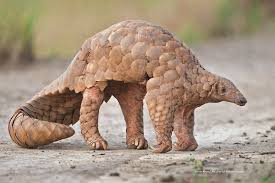In a rubble-strewn storage lot in the sprawling Nigerian port city of Lagos, customs agents crack open a shipping container crammed with scales from pangolins, a shy mammal prized in Asia for its use in medicines.
The scales being stored with elephant tusks in the fetid container are part of a growing haul of pangolin cargos seized in Nigeria, a country that is now the main hub for gangs sending African pangolins to Asia, according to law enforcement officials, non-governmental organisations and wildlife experts.
They say porous borders, lax law enforcement, corruption and one of the continent’s biggest ports have helped criminal networks in Nigeria corner most of the African trade in pangolins, considered to be the world’s most trafficked mammal.
Ranging in size from a small rabbit to a large dog depending on the species, pangolins are the only mammals with scales. The nocturnal tree-climbers that feed on ants and termites are more closely related to bears than the anteaters they resemble.
This year alone, Hong Kong and Singapore have intercepted three huge shipments of pangolin scales weighing a combined 33.9 tonnes and worth more than $100 million, based on estimates of their value in Singapore.
Each shipment was bigger than any that had come from Africa before this year – and they all came from Nigeria.
According to wildlife trade watchdog TRAFFIC, less than a quarter of major pangolin seizures from Africa came via Nigeria in 2016. By 2018, that had jumped to almost two-thirds and three-quarters of the total weight seized was linked to Nigeria.
Graphic showing African pangolin seizures: https://tmsnrt.rs/305DnlC
“Traffickers like Nigeria more than anywhere else … they prefer to go there because it makes it easier for them to export,” said Eric Kaba Tah, deputy director of wildlife law enforcement group The Last Great Ape Organization in Cameroon.
“The situation for pangolins is becoming more and more serious and even more dangerous,” said Tah, who has helped crack down on the trade in Cameroon, one of the other main pangolin trafficking routes to Asia.
Other African countries known for pangolin trafficking such as Kenya, South Africa, Tanzania and Uganda all say they have clamped down on the illicit trade as well – pushing pangolin traffickers towards Nigeria instead.
‘TOO MANY FRONTS’
Pangolin meat is considered a delicacy in some Asian markets and the pangolin’s hard keratin scales – the stuff of human fingernails and rhino horns – are dried, ground into powder, and used in medicines in China to treat ailments such as poor lactation, sores and rheumatism.
Demand for African pangolins in countries such as China and Vietnam has been growing as the number of Asian pangolins has dwindled over the years, to the point where two of the four Asian species are now on the critically endangered list.
The other two are endangered and all four African species of pangolin were classed as vulnerable by the International Union for Conservation of Nature when all commercial trade in pangolins, also known as scaly anteaters, was banned in 2016.
“At the rate at which pangolins are being traded and poached, it could take two decades for the mammal to be extinct,” said Ray Jansen, chairman of the African Pangolin Working Group in Pretoria.
Nigerian customs officials disagree with the idea their country has become a pangolin trading hub. Assistant Comptroller Mutalib Sule argues that pangolin trafficking through the West African country is on the decline.
“There is tight effort at the borders to ensure that such things do not come in again,” he said, adding that no country had been able to stamp out smuggling altogether.
According to customs officials in Nigeria, agents seized 927 kg of pangolin goods in 2016, 402 kg in 2017, and then seizures rocketed to 12.3 tonnes in 2018.
“Sometimes Nigeria is just a point of convergence,” said Sule.
Oliver Stolpe, the United Nations Office on Drugs and Crime (UNODC) representative for Nigeria, said the problem was that pangolin trafficking was just one in a long list of criminal activities facing the authorities in the West African country.
“Nigeria is fighting crime on so many fronts,” Stolpe said. “It’s simply too many fronts.”
TIP OF THE ICEBERG
Experts say it’s hard to draw definitive conclusions from data about seizures. A surge in interceptions could just mean law enforcement agencies were doing their job better, rather than there being a major increase in trafficking.
But TRAFFIC’s Sone Nnoke said the sheer number of seizures of pangolin products that have come via Nigeria points to the country now being the main hub for the illegal trade.
“Because of porous borders it’s very easy to take those products to Nigeria,” said Nnoke.
Jansen at the African Pangolin Working Group said seizures very likely only represent about 10% of the actual trade in pangolin scales so the surge in intercepted cargos from Africa was a worrying trend.
According to TRAFFIC, which tracks seizures of more than half a tonne, 67.6 tonnes of pangolin scales from Africa have been seized throughout the world this year, already almost double the amount in 2018.
The Tikki Hywood Foundation, which rescues pangolins in Zimbabwe and Cameroon, estimates 1,666 of smaller white-bellied pangolins need to be killed for one tonne of scales. When it comes to the giant pangolin, that drops to 277 animals.
So the 67.6 tonnes of scales from Africa seized this year and tracked by TRAFFIC would have needed anywhere from 18,725 to 112,620 pangolins to be killed, depending on the species.
‘HUGE AMOUNTS’
The economic motivation for smugglers is strong. In Nigeria, a whole pangolin can sell for as little as $7. But once in China or Vietnam, the scales from one animal alone can fetch $250, according to UNODC.
Yet Nigeria is not just a staging ground where pangolin parts from around Africa are amassed before being shipped to Asia. The country has its own population of the furtive creatures, living mainly in the thick forests of the southwest.
Here, generations of families have hunted, traded and made medicine from “akika”, the Yoruba name for pangolins.
Many of the traders, particularly those dealing in animals hunted in the surrounding forests, said foreigners they believed to be Chinese were buying pangolins or their parts in ever greater quantities.
“They pay huge amounts of money,” said Agbetuya Babatope Samuel, a traditional healer and trader in the town of Akure in Ondo state. “When I get their money I laugh to the bank,” he said. “I wish it would continue for a long time.”
The high demand is taking its toll.
When the sun has set, Sule Ayinla stalks the dark, thick forests of Ondo Akoko in southwest Nigeria for pangolins, a torch fixed to his head. Hearing a rustle, he fires his long-barrelled gun at a tree, to no avail.
“We used to hunt pangolin here,” Ayinla said, lowering his weapon. Taught to hunt by his father, he said the trade was getting tougher and it was becoming rare to find pangolins hiding in the trees where they typically find cover.
“There used to be lots of animals in this forest but they are scarce now.”
.Reuters













